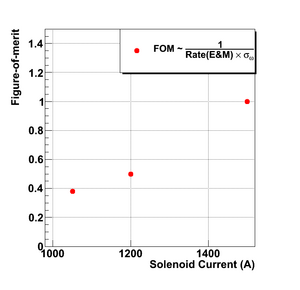Difference between revisions of "Experimental Sensitivity to Solenoidal Field"
From GlueXWiki
(→Figure-of-Merit) |
(→References) |
||
| Line 3: | Line 3: | ||
* [http://argus.phys.uregina.ca/cgi-bin/private/DocDB/ShowDocument?docid=1471 GlueX-doc-1471] Electromagnetic Background Rate Studies (for different solenoid magnet fields and FDC hole sizes) | * [http://argus.phys.uregina.ca/cgi-bin/private/DocDB/ShowDocument?docid=1471 GlueX-doc-1471] Electromagnetic Background Rate Studies (for different solenoid magnet fields and FDC hole sizes) | ||
* [http://argus.phys.uregina.ca/cgi-bin/private/DocDB/ShowDocument?docid=1469 GlueX-doc-1469] Studies of particle reconstruction for <math>\omega</math> and X(2000) events | * [http://argus.phys.uregina.ca/cgi-bin/private/DocDB/ShowDocument?docid=1469 GlueX-doc-1469] Studies of particle reconstruction for <math>\omega</math> and X(2000) events | ||
| + | * [http://argus.phys.uregina.ca/cgi-bin/private/DocDB/ShowDocument?docid=1489 GlueX-doc-1489] Omega reconstruction / Justification for Bfield settings | ||
= Figure-of-Merit = | = Figure-of-Merit = | ||
Revision as of 08:59, 27 June 2012
References
- GlueX-doc-1425 Magnetic Field Studies Status
- GlueX-doc-1471 Electromagnetic Background Rate Studies (for different solenoid magnet fields and FDC hole sizes)
- GlueX-doc-1469 Studies of particle reconstruction for
 and X(2000) events
and X(2000) events - GlueX-doc-1489 Omega reconstruction / Justification for Bfield settings
Figure-of-Merit
We construct a Figure-of-Merit (FOM) based on the calculated electromagnetic background rates in the detector and the resolution for reconstructing omega mesons, such that it will be inversely proportional to running time to attain a given statistical significance. The validity for this FOM is based on the following argument:
- Statistical significance ~ signal/sqrt(background)
- signal ~ time x luminosity
- background ~ time x luminosity x width of signal peak
In addition, we assume that the luminosity is limited by the rates in the detectors, which is dominated by electromagnetic background. Therefore
- luminosity ~
 , where
, where  is the rate in one of the inner detectors, either the start counter or the FDC. (We use the start counter rate)
is the rate in one of the inner detectors, either the start counter or the FDC. (We use the start counter rate)
Therefore,
- Significance ~ time x luminosity / sqrt (time x luminosity x width) ~ sqrt (time x luminosity / width) ~ sqrt (time / (
 x width)
x width) - For constant significance, the experimental run time ~
 x width = 1/FOM.
x width = 1/FOM.
We note that the calculated rates give  , and
, and  , which leads to
, which leads to  . See figure below:
. See figure below:
